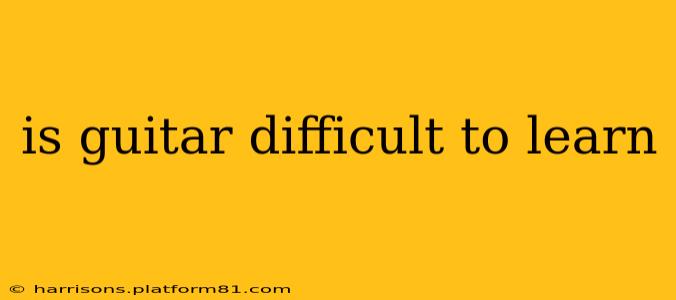Learning guitar, like any instrument, presents a unique set of challenges. The difficulty isn't uniform; it depends heavily on individual aptitude, learning style, dedication, and the specific goals you set. While some find it relatively easy to pick up the basics, others might encounter significant hurdles. This guide aims to provide a nuanced perspective, addressing common concerns and offering insights to help you determine if learning guitar is the right path for you.
Is Guitar Harder Than Other Instruments?
This is a subjective question with no definitive answer. Some might find the physical coordination required for guitar more challenging than, say, learning the piano's keyboard layout. Others may struggle more with the theoretical aspects of music, which are equally important regardless of the instrument. Ultimately, the perceived difficulty depends on your individual strengths and weaknesses. Consider what aspects of music you enjoy most, and whether those align with the demands of the guitar.
How Long Does It Take to Learn Guitar?
There's no magic number. Learning guitar is a journey, not a race. You can learn basic chords and strumming patterns within weeks, but mastering techniques like fingerstyle, improvisation, and complex chord progressions takes years of dedicated practice. Consistent effort is key; even short, focused practice sessions are more effective than infrequent, long ones.
What Are the Biggest Challenges for Beginners?
Many beginners face similar challenges:
- Finger Strength and Dexterity: Developing the finger strength and dexterity required for fretting chords and performing various techniques can be initially challenging. This improves with regular practice.
- Chord Changes: Smoothly transitioning between chords requires coordination and practice. Initially, chord changes might feel awkward and slow.
- Calluses: Expect some initial discomfort as calluses develop on your fingertips. This is a normal part of the learning process.
- Reading Music (Optional): While not strictly necessary to learn guitar, reading music can significantly enhance your understanding and speed up learning.
What If I Have No Musical Background?
Having no prior musical experience doesn't preclude you from learning guitar. Many successful guitarists started with no formal training. Patience and persistence are key. Consider starting with simplified learning resources, focusing on basic chords and strumming patterns before tackling more advanced techniques.
Can I Learn Guitar by Myself?
Absolutely! Many resources are available online, including video tutorials, online courses, and apps. However, having a teacher can provide structured learning, personalized feedback, and guidance, which can greatly accelerate your progress and prevent the development of bad habits.
Is it Too Late to Learn Guitar at [Age]?
It's never too late to learn guitar! People of all ages pick up the guitar and find joy in playing. While younger learners may have an advantage in terms of adaptability and learning speed, age is no barrier to learning a new skill.
What Kind of Guitar Should I Buy for Beginners?
Acoustic guitars are a popular choice for beginners due to their simplicity and affordability. However, electric guitars can also be a good starting point, offering a wider range of sounds and potentially easier playing action. Consider your budget and musical preferences when choosing your first guitar.
In conclusion, the difficulty of learning guitar is relative. While it requires dedication and practice, the rewards of playing are immense. By understanding the challenges and approaching learning with a patient and persistent mindset, you can unlock the joy of playing the guitar, regardless of your background or age.
